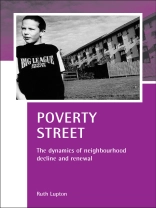Poverty street addresses one of the UK’s major social policy concerns: the gap between the poorest neighbourhoods and the rest of the country. It is an account of neighbourhood decline, a portrait of conditions in the most disadvantaged areas and an up-to-date analysis of the impact of the government’s neighbourhood renewal policies. The book: · explores twelve of the most disadvantaged areas in England and Wales, from Newcastle in the north to Thanet in the south, providing the reader with a unique journey around the country’s poverty map; · combines evidence from neighbourhood statistics, photographs and the accounts of local people with analysis of broader social and economic trends; · assesses the effect of government policies since 1997 and considers future prospects for reducing inequalities. CASE Studies on Poverty, Place and Policy series Series Editor: John Hills, Director of CASE at the London School of Economics and Political Science. Drawing on the findings of the ESRC Centre for Analysis of Social Exclusion’s extensive research programme into communities, poverty and family life in Britain, this fascinating series: Provides a rich and detailed analysis of anti-poverty policy in action. Focuses on the individual and social factors that promote regeneration, recovery and renewal. For other titles in this series, please follow the series link from the main catalogue page.
About the author
Ruth Lupton is a Research Fellow at the ESRC Centre for Analysis of Social Exclusion at the London School of Economics and Political Science.












